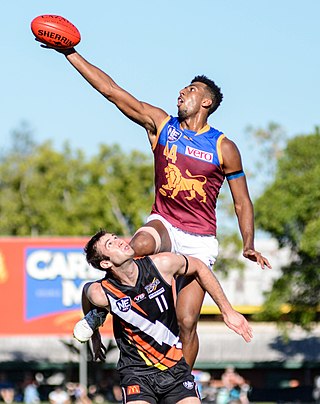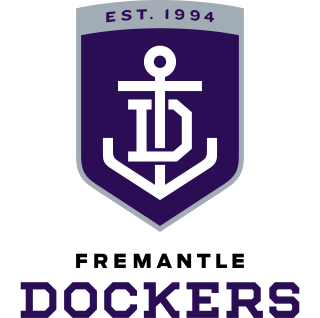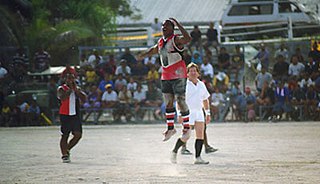
Australian football, also called Australian rules football or Aussie rules, or more simply football or footy, is a contact sport played between two teams of 18 players on an oval field, often a modified cricket ground. Points are scored by kicking the oval ball between the central goal posts, or between a central and outer post.

The Fremantle Football Club, nicknamed the Dockers, is a professional Australian rules football club competing in the Australian Football League (AFL), the sport's elite competition. The team was founded in 1994 to represent the port city of Fremantle, a stronghold of Australian rules football in Western Australia. The Dockers were the second team from the state to be admitted to the competition, following the West Coast Eagles in 1987. Both Fremantle and the West Coast Eagles are owned by the West Australian Football Commission (WAFC), with a board of directors operating Fremantle on the commission's behalf.

Football in Australia refers to numerous codes which each have major shares of the mainstream sports market, media, broadcasting, professional athletes, financial performance and grassroots participation: Australian rules football, rugby league, rugby union and association football. There are four pre-eminent professional football competitions played in Australia: the Australian Football League, the National Rugby League, Super Rugby and the A-League (soccer). By most measures, including attendance, television audience and media presence across the most states, Australian football is the most popular nationally. However, in the states of New South Wales and Queensland, rugby football is overall the most watched and receives the most media coverage, especially the Rugby League State of Origin contested between the two states referred to as “Australian sport's greatest rivalry”. In recent times there has been an increase in popularity in Australian football and corresponding decrease in popularity of Rugby union in New South Wales and Queensland. Soccer, while extending its lead in participation rate particularly in the large cities and improving its performance at the FIFA World Cup, continues to attract the overall lowest attendance as well as media and public interest of the four codes.

Marn Grook, marn-grook or marngrook is the popular collective name for traditional Indigenous Australian football games played at gatherings and celebrations by sometimes more than 100 players. From the Woiwurung language of the Kulin people, it means "ball" and "game".
The Australian Football International Cup is a triennial international tournament in Australian rules football. It is the biggest international tournament in the sport that is open to all nations. More than 26 nations have participated and the competition has expanded into multiple pools and both men and women's divisions. At the time of the last tournament in 2017, the sport had a record 170,744 registered players outside Australia growing at a rate of 25% per annum.

The Geography of Australian rules football describes the sport of Australian rules football played in more than 60 countries around the world. By 2017 more than 26 nations had contested the Australian Football International Cup, the highest level of worldwide competition.

Australian rules football in Queensland was the first official football code played in 1866. The Colony of Queensland was the second after Victoria to adopt Australian rules football, just days after the rules were widely published. For two decades it was the most popular football code, however a strong desire for representative football success saw Queenslanders favour British football variants for more than a century. As a result, Queensland is one of the two states to the east of the Australian cultural divide described as the Barassi Line. 120 years later in 1986 Queensland was the first state awarded a licence to have a club, the Brisbane Bears, in the national (AFL) competition, also its first privately owned club. However the Gold Coast based Bears had a detrimental effect until the 1993 redevelopment of the Brisbane Cricket Ground (Gabba). In contrast the Bears transformation into a Brisbane and traditional membership based club resulted in enormous growth, and a tripling of average AFL attendances by 1996.
A blue is an award of sporting colours earned by athletes at some universities and schools for competition at the highest level. The awarding of blues began at Oxford and Cambridge universities in England. They are now awarded at a number of other British universities and at some universities in Australia, Canada and New Zealand.

Women's Australian rules football, is the female-only form of Australian rules football, generally with some modification to the laws of the game.

Australian rules football in England is a team sport and spectator sport with a long history. The annual match between Oxford and Cambridge Universities is the longest running Australian rules fixture outside Australia. The current competitions originated in 1989 and have grown to a number of local and regional leagues coordinated by AFL England. In 2018, these regional divisions were the AFL London, AFL Central & Northern England and Southern England AFL.

The Australian Football League (AFL) is the pre-eminent and only fully professional competition of Australian rules football. It was originally named the Victorian Football League (VFL) and was founded in 1896 as a breakaway competition from the Victorian Football Association (VFA), with its inaugural season in 1897. It changed its name to Australian Football League in 1990 after expanding its competition to other Australian states in the 1980s. The AFL publishes its Laws of Australian football, which are used, with variations, by other Australian football organisations.

Australian rules football in Victoria is the most watched and second most participated code of football. Australian rules football originated in Melbourne in the late 1850s and grew quickly to dominate the sport, which it continues to. Victoria has more than double the number of players of any other state in Australia accounting for approximately 42% of all Australian players in 2023 and continues to grow strongly. Only Soccer in Victoria has more football participants, though the code's growth in Victoria has made up much ground lost to that code over previous decades such that they have now a similar number of players. The sport is governed by AFL Victoria based in Melbourne. The national governing body, the AFL Commission is also based in Melbourne.
The AFL Commission is the governing body of the Australian Football League Limited (AFL), its subsidiaries and controlled entities. Richard Goyder has been chairman since 4 April 2017, replacing Mike Fitzpatrick.

Australian rules football is the most watched and attended sport and the second most participated code of football in Australia. Since originating in Victoria in 1858 and spreading elsewhere from 1866, it has been played continuously in every Australian state since 1903 plus the two major territories since 1916.

Australian rules football is played in Europe at an amateur level in a large number of countries. The oldest and largest leagues are those in the United Kingdom, Ireland and Denmark, in each of these nations there are several established clubs, and organised men's, women's and juniors programs. The British AFL has now expanded into Welsh, Scottish and English leagues. The Danish AFL has been responsible for the expansion of Australian Football into Sweden, Finland, Iceland and Norway. The governing body for Australian Football in Europe was founded in Frankfurt in January 2010; the body was initially called the European Australian Football Association, but changed its name to AFL Europe at a general assembly meeting in Milan in October of the same year. It currently has 22 member nations. AFL Europe, with backing of the AFL in Australia has overseen a large improvement in the organisation of Australian football in Europe.

The Gold Coast Suns is a professional Australian rules football club that competes in the Australian Football League (AFL). The club is based on Queensland's Gold Coast in the suburb of Carrara.
Oxford University Australian Rules Football Club is an Australian rules football club representing the University of Oxford in the United Kingdom and playing in the AFL England National University League. The club operates under the auspices of the Oxford University Sport Federation.

Justin Clarke is a former professional Australian rules footballer who played for Brisbane Lions in the Australian Football League (AFL) from 2012 to 2016. Clarke grew up in the small town of Booleroo Centre in the southern Flinders Ranges region of South Australia. Throughout his childhood Clarke had a strong interest in aviation, but his application to join the Air Force was denied as he was too tall. He completed high school with an ATAR of 99.95.

AFL Women's (AFLW) is Australia's national semi-professional Australian rules football league for female players. The first season of the league in February and March 2017 had eight teams; the league expanded to 10 teams in the 2019 season, 14 teams in 2020 and 18 teams in 2022. The league is run by the Australian Football League (AFL) and is contested by each of the clubs from that competition. The reigning premiers are Melbourne.
The annual Oxford-Cambridge Intervarsity Australian Rules Football Match is the longest running Australian rules football fixture outside Australia. Played as early as 1911, it has been contested annually by men's teams since 1923 between the two longest running clubs outside Australia, the Oxford University Australian Rules Football Club and the Cambridge University Australian Rules Football Club.
















